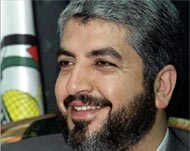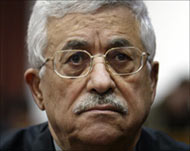Al-Barghuthi to run in Palestinian polls
Jailed Palestinian leader Marwan al-Barghuthi has decided to run for Palestinian president, reversing his earlier decision to stay out of the race.

Al-Barghuthi’s wife said her husband – perhaps the most popular Palestinian politician following Yasir Arafat’s death – had officially entered the 9 January contest, after visiting him in his Israeli cell.
“I am running in this democratic battle … to achieve peace on the basis of justice, freedom, the return of Palestinian refugees, and freedom for our prisoners,” al-Barghuthi said in a statement read by his wife. He called for a fair election campaign.
Al-Barghuthi’s decision to run as an independent could throw the election wide open and pose a dramatic challenge to current frontrunner Mahmud Abbas, a former prime minister who lacks strong grassroots support.
Palestinian officials originally said last Thursday that al-Barghuthi had decided not to run. After he came under pressure from Fatah officials worried about a split in their movement, he opted on Friday to drop his candidacy.
Today’s U-turn drew swift condemnation from Fatah’s central committee, which called the move an “act of political irresponsibility” and said al-Barghuthi was abandoning
his Fatah affiliation by running against its candidate.
“Walking away from the decision of the Fatah institutions is an assault on Fatah,” said Tayyib Abd al-Rahim, a senior
Palestinian official who spoke on behalf of the committee.
Al-Barghuthi is currently in an Israeli jail accused of assisting attacks on Israeli civilians. He denies the charges.
Hamas boycott
Meanwhile, the Palestinian Islamic resistance group Hamas has pledged to boycott a 9 January presidential election for a successor to Arafat.
 |
|
Hamas chief Khalid Mishal is due |
“We in the Islamic resistance announce our boycott and our non-participation in the presidential elections for the Palestinian Authority,” Ismail Haniya, a senior Hamas leader, said in Gaza City on Wednesday.
Haniya said Hamas was not fielding a candidate because it considered the election merely a tool to prop up the Palestinian Authority, created under interim peace deals Arafat forged with Israel a decade ago that Islamic groups rejected.
Usama Hamdan, a Hamas spokesman based in Lebanon, told Aljazeera that the elections would not serve the national interest.
“We have pledged to boycott the election which is based on factional needs and not on the objectives of the Palestinians and their issues,” he said.
“Hamas will keep on participating in Palestinian political life and boycotting elections does not mean an end to the political process.”
An unnamed Hamas official in Beirut said Mahmud Abbas – the favourite to succeed Arafat – plans to meet members of Hamas when he travels to Damascus next week.
The official said Abbas spoke by telephone to Hamas politburo head Khalid Mishal on Saturday and that they agreed to meet on 6 December.
Power sharing
Hamas has previously called for a share of power in an interim post-Arafat leadership and parliamentary and municipal elections. No Palestinian vote has been held since 1996.
 |
|
Abbas is opposed to armed |
Abbas, nominated by the Fatah movement which dominates the Palestinian Authority, wants the armed Palestinian revolt against Israel in the occupied territories to stop.
He aims to renew peace talks with Israel aimed at a Palestinian state in the occupied territories.
If Abbas does go to Damascus, it would be a rare public contact between Syria and Palestinian leaders close to Arafat, whose pursuit of a negotiated peace with Israel under the 1993 Oslo Accords infuriated Syria.
It would also come during a battle for influence between Abbas, who is favoured by Israel and the United States, and less conciliatory but popular Palestinian groups such as Hamas.
The Islamic resistance organisation and other Palestinian factions opposed to Oslo were hosted for years in Damascus, but have kept a lower profile since Washington increased pressure on Syria over their presence in recent years.